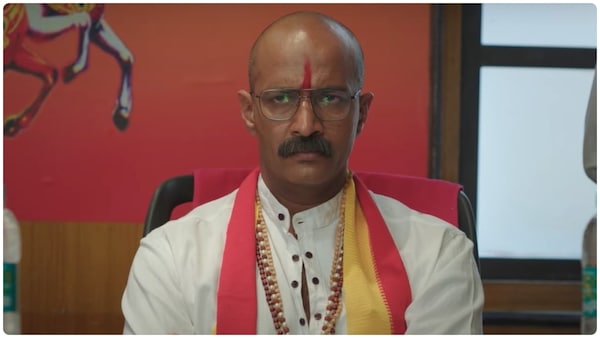Pentagon review: An enterprising, 'theme-rich' attempt that keeps you hooked
Guru Deshpande (Creative Director and Producer) is joined by four other filmmakers who put together an engaging anthology feature.

Last Updated: 01.09 PM, Apr 06, 2023
Story:
A collection of five short films helmed by five different filmmakers, Pentagon is an overarching view of life, death and everything in between.
Review:
Death is both the operative word and the crux of the latest Kannada film Pentagon, an anthology comprising five short films carried out by five different filmmakers. Each filmmaker, chosen wisely by creative director and producer Guru Deshpande (who also directs one of the five films), submits a unique gaze towards life and constructs a narrative that’s precariously balanced between life and death, with the plots trying to oscillate from one to another and keeping us intrigued. And to make things more engaging, each film carries its own theme and sensibility in the form of a comedy/farce, melodrama or thriller.
In order to communicate the motif of death in a more subtextual manner, the makers use a crow as the messenger to determine which character would get the axe. The employment of the crow is quite interesting because you are often caught off-guard when the bird appears on screen to suggest that there is death around the corner.
On paper, Pentagon is an enterprising idea that is stitched together convincingly because of an underlying concept. But in execution, the team falters in bringing nuance and style to the fore and ends up making the viewer feel slightly puzzled over the “purpose” behind it all. When I say purpose, I don’t mean a kind of deliberate attempt to pass on a message of some important value, but rather a sense of uniformity that binds everything together. Pentagon, just as with any other Kannada anthology film that has come out in the last couple of years, remains engaging only in parts but does not work as the intended full-length feature.
The first of the five shorts is Chandra Mohan’s Mr. Goofy’s Cafe, a farcical death story that is centred on a man who is hell-bent on dying and hires his own hitman to get there. An exciting setup, no doubt, and Chandra Mohan tries to expand the absurdity as much as possible by bringing an array of other characters to the fore and making the man’s death-wish feel more like a curse. However, the farce only leads to silliness and what should have been a carefully constructed series of mishaps, ends up becoming an unfunny mess. I expected a lot from this opening segment but was let down by the lack of imagination in the staging.
Akash Srivatsa of Shivaji Surathkal 2 features as the second director on the list with his short Mysore Pak. A simple, slice-of-life kind of story (both in terms of presentation and messaging) about a retired old teacher who discovers this new technical marvel called Swiggy. The app, turns out, allows him to order all those dishes (particularly the Balepet Mysore Pak) that his grump of a daughter-in-law wouldn’t cook for him, and live a merry life. This short, too, begins on a promising note but remains restricted to cliches and a soap opera-like tone for some reason, and bafflingly, never really takes off. To be honest, I still can’t make anything of this segment.
The third segment comes as a courtesy of actor-director Raghu Shivamogga, who tries to lend a sexy edge to the theme of death. Titled Kamaturanam Na Bhayam Na Lajja, the film is a thriller at heart about a murder investigation that has a naive young boy as the suspect. Raghu Shivamogga first titillates us with all the sleaze but quickly deviates to make the whole point to be something else altogether. There is sex chatting, blackmailing and an entire racket thrown in and the film remains enjoyable to a larger extent. It needed a bit more finesse, though.
The entire post-interval portion is dedicated to the two most cinematic short films of the lot, both shot by the talented cinematographer Abhilash Kalathi. First of the two is Kiran Kumar’s Doni Sagali Munde Hogali, a social drama set in a large plantation about caste-based hierarchy. In one of the more compelling stories of the film, Kiran Kumar uses death as a concept to discuss a larger idea and manages to weave an intricate tale that keeps us interested throughout. Aided by the fine performances of the cast, this particular segment is a notch above the rest with respect to storytelling.
And finally, Guru Deshpande's much-discussed short Karma has Kishore and Pruthvi Ambaar headlining it, with the filmmaker opting to use Kannada activism as the backdrop. 'There's more to this than meets the eye' is what Deshpande wishes to communicate and keeps us hooked throughout with an interesting story which is, in essence, about one's right to land, language and culture. While it manages to offer twists and turns in abundance, the overall impact of the film ended up being slightly underwhelming because the attempt to surprise us comes at the cost of the subtext. Both Kishore and Pruthvi Ambaar deliver fine performances.
Verdict:
Anthologies have always been tricky and very few of them end up being worthwhile because of the limitations of the format. That said, Pentagon works quite well with the help of a unifying theme and there's a lot to savour here. While the first two short films don't work as well, the remaining three salvage the film and keep us engaged till the last minute. The filmmaking is a tad amateurish (particularly in the first half) and one would have liked to see more subtlety in the storytelling, but the film works regardless because there's plenty to choose from. If you are in the mood for a wholesome experience, do pay a visit to a cinema hall to check out Pentagon.

 Premium
Premium